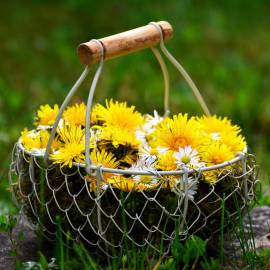






Taraxacum Seeds
1.14 €
What's better than a plant that gives wishes when you puff its fluff? A plant that provides health benefits! Dandelion is an excellent food and medicine! Dandelion is most often thought of as a pesky weed that likes to take over our lawns and gardens.
-
Taraxacum / dandelion
What's better than a plant that gives wishes when you puff its fluff? A plant that provides health benefits! Dandelion is an excellent food and medicine!
Dandelion is most often thought of as a pesky weed that likes to take over our lawns and gardens. They overwhelm meadows, soccer fields, and are the bane of golf courses. They even pop up in cracked sidewalks and pavement. Dandelion is invasive and pervasive. Lucky for us, it's also an excellent food and herbal medicine that anyone can find, grow, and put to use.
Dandelion is a very rich source of beta-carotene which we convert into vitamin A. This flowering plant is also rich in vitamin C, fiber, potassium, iron, calcium, magnesium, zinc, and phosphorus. It's a good place to get B complex vitamins, trace minerals, organic sodium, and even some vitamin D too. Dandelion also contains protein, more than spinach. It has been eaten for thousands of years as a food and as a medicine to treat anemia, scurvy, skin problems, blood disorders, and depression.
Digestive Aid
Dandelion acts as a mild laxative that promotes digestion, stimulates appetite, and balances the natural and beneficial bacteria in the intestines. It can increase the release of stomach acid and bile to aid digestion, especially of fats.
Kidney
This weed-like superfood is a diuretic that helps the kidneys clear out waste, salt, and excess water by increasing urine production. In French it is called pissenlit, which translates roughly to wet the bed. This inhibits microbial growth in the urinary system too. Dandelion also replaces some of the potassium lost in the process.
Liver
Dandelion has been shown to improve liver function by removing toxins and reestablishing hydration and electrolyte balance. It also increases the release of bile.
Antioxidants
Every part of the dandelion plant is rich in antioxidants that prevent free-radical damage to cells and DNA, slowing down the aging process in our cells. It is rich in vitamin C and vitamin A as beta-carotene and increases the liver's production of superoxide dismutase.
Cancer
The ability to combat cancer is not a claim made lightly, but dandelion seems to show promise in study after study after study. Dandelion may slow cancer's growth and prevent it from spreading. The leaves are especially rich in the antioxidants and phytonutrients that combat cancer.
Diabetes
Recent animal studies show dandelion helps regulate blood sugar and insulin levels. Most of this is done through its ability to control lipid levels.
High Blood Pressure
As a diuretic, dandelion increases urination which then lowers blood pressure. The fiber and potassium in dandelion also help regulate blood pressure.
Cholesterol
Animal studies have shown how dandelion lowers and controls cholesterol levels while improving cholesterol ratios by raising HDL.
Gallbladder
Dandelion increases bile production and reduces inflammation to help with gallbladder problems and blockages.
Inflammation
Dandelion contains essential fatty acids, antioxidants, and phytonutrients that all reduce inflammation throughout the body. This can relieve pain and swelling.
Immune System
Studies also show that dandelion boosts immune function and fights off microbes and fungi.
Dandelion leaves, flowers, and roots are all edible. They have a slightly bitter flavor that can be minimized by harvesting them in the fall or spring. The young leaves are tenderer and less bitter, making a great addition to raw salads. Cooking dandelion cuts the bitter flavor of both the leaves and the roots.
Dandelion is generally considered safe in food and medicinal levels. Some people may have allergic reactions to dandelion. Anyone with an allergy to ragweed, chrysanthemum, marigold, chamomile, yarrow, or daisy should avoid dandelion, and anyone pregnant, nursing, or taking prescription drugs should talk to a health care professional before adding something new to their diet.
